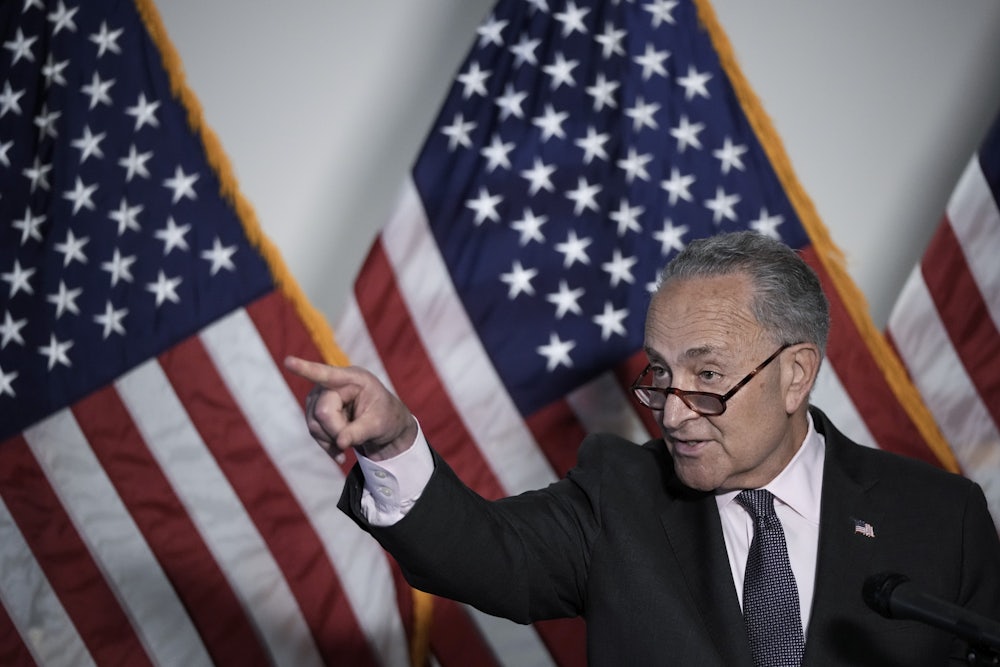The Senate voted 68–32 Tuesday to pass the U.S. Innovation and Competition Act, a wide-ranging package promoted by Senate Majority Leader Chuck Schumer and Republican Todd Young, aimed at countering unspecified threats from China. Young summed up the package’s rationale thus: “When future generations of Americans cast their gaze toward new frontiers, will they see a red flag planted on those new frontiers that is not our own? Today, we answer unequivocally, ‘No.’” Aping a talking point from President Biden, Young added, “Today we declare our intention to win this century, and those that follow it as well.”
It’s an ironic turn of phrase considering that Democrats have yet to pass legislation tackling the single greatest threat humanity faces in this century and those to follow: the climate crisis.
Shortly after the American Rescue Plan passed in March, Schumer decided not to focus on climate legislation and instead to eke out a bipartisan victory via an anti-China bill. The idea was to wrap independently popular industrial policy in the language of great power rivalry—or, in other words, to offer Republicans some jingoism in exchange for their support for greenish manufacturing. More overtly hawkish measures from Senator Robert Menendez’s Strategic Competition Act were folded into the 2,400-page final bill, too. It tracks with recent moves from the Biden administration, which backed the package early on. As Kurt Campbell, the National Security Council’s coordinator for Indo-Pacific affairs, said recently of the U.S.-China relationship, “The period that was broadly described as engagement has come to an end.… The dominant paradigm is going to be competition.” So what have Democrats gotten in exchange for embracing this manifest destiny nationalism?
Not much. One component is likely to end up as a $10 billion giveaway to Jeff Bezos’s spaceship company. Another hands a $52 million blank check to microchip manufacturers. Republicans were able to whittle the bill’s most promising components—$100 billion for the National Science Foundation, for instance—down to a pittance. Even foreign policy hawks were disappointed by the resulting package, though they arguably won more than those pushing for it in hopes of beefing up R&D. If the bill becomes law, federal employees would be barred from downloading TikTok, and national security officials would be tasked with collecting intel on Chinese influence in the International Monetary Fund, the World Bank, the United Nations, and the World Trade Organization. Another provision promotes a space race between the two countries, commercializing low-orbit spaceflight. If Schumer was attempting to play 12-dimensional chess with this package, he lost.
Reaching bipartisan agreement on the U.S. Innovation and Competition Act has not bred goodwill for future deals. Neither has it given voters a clear reason to believe that Democratic rule will make their lives better. If anything, the bill has created a wealth of opportunities for Republicans to extract giveaways for their donors. It does not make climate policy more likely, particularly given how much time Schumer burned to make it happen. Negotiations over the infrastructure package between Biden and a Republican group led by West Virginia Republican Shelly Moore Capito have broken down, as the president embarks on a new round of talks with centrists from both parties. White House climate adviser Gina McCarthy is already downplaying hopes that key climate provisions will get included in an infrastructure deal.
Besides being unhelpful, the bill’s knock-on effects could be actively harmful. As a coalition of 66 organizations argued in the lead-up to the bill’s passage, “Anti-China framing for such initiatives is not only politically unnecessary; it is harmful, as it inevitably feeds racism, violence, xenophobia, and white nationalism.” Bipartisan hawkishness is helping poison a relationship that will be critical for confronting the climate crisis, too. Torching hopes for strategic engagement between the United States and China is a quick route to climate destruction, sabotaging both the supply chains and diplomacy needed to transition off fossil fuels. American saber-rattling empowers right-wing nationalists not just at home but also in China, where hard-liners are eager to use America’s fighting words to double down on their own regressive domestic agenda.
The anxieties bound up in American politicians’ anti-China fervor have less to do with China than failings within our own borders. If investment in innovation is low, it’s in part because lax constraints on things like stock buybacks have made it more attractive for executives to line shareholder pockets than to invest in the real economy. Sluggish technology and clean energy innovation here aren’t the result of foreign intellectual property theft but decades of policy hollowing out our own public sphere, which has a history of backing cutting-edge research and deployment. Remedying those problems—backing real industrial policy—doesn’t require ginning up a new Cold War or ceding ground to the Trumpist right that’s eager for one. The question is whether lawmakers are creative enough to build a better, more sustainable country for the sake of something other than world domination.








